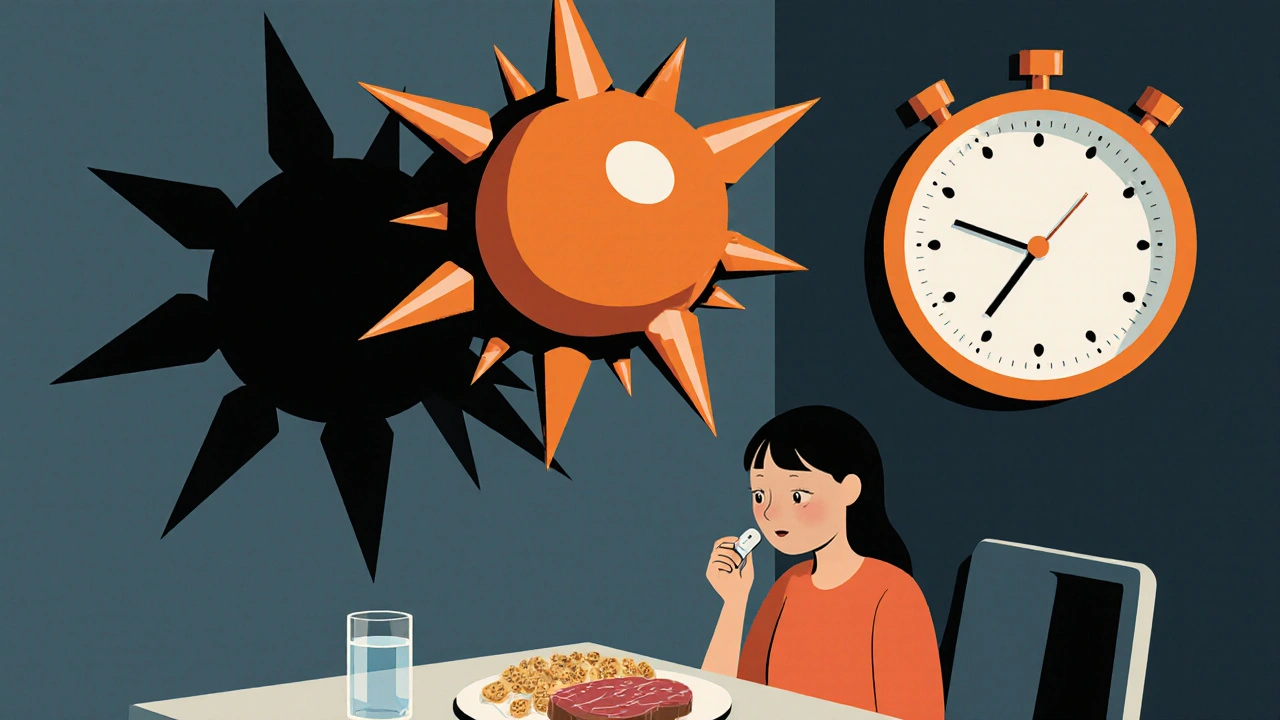Thyroid Medication Timing Calculator
Calculate Your Safe Iron Intake Window
Input your levothyroxine timing and iron source to find the optimal waiting period
When you're taking levothyroxine for hypothyroidism, what you eat can make or break your treatment. It's not just about eating healthy-it's about timing. Iron-rich meals and supplements can block your thyroid medication from being absorbed, turning your daily pill into a waste of money and energy. And if you're not careful, your TSH levels stay out of range, leaving you tired, gaining weight, or feeling depressed-even though you're doing everything right.
Why Iron Ruins Thyroid Medication Absorption
Levothyroxine, the synthetic form of thyroid hormone, needs a clean path to your bloodstream. But iron-whether from a supplement, red meat, spinach, or fortified cereal-sticks to the medication in your gut. They form a chemical bond that your body can't break down. As a result, up to half the dose never gets absorbed.
This isn't speculation. A 2021 study in the Journal of Clinical Endocrinology & Metabolism found that 87% of people who took iron and levothyroxine together saw their absorption drop by 30% to 50%. That’s not a small hiccup-it’s a treatment failure. Iron doesn’t just interfere with pills; it messes with your body’s ability to maintain stable hormone levels. And if your thyroid hormone stays low, your metabolism slows, your cholesterol rises, and your energy crashes.
How Much Iron Is Too Much?
Not all iron is created equal. Iron supplements-like ferrous sulfate, ferrous fumarate, or ferrous gluconate-are concentrated. A typical tablet contains 65 mg of elemental iron. That’s a lot. Even a single supplement can cut absorption by 40% or more.
Dietary iron is weaker, but still dangerous if eaten at the wrong time. Red meat (heme iron) reduces absorption by about 22%. Iron-fortified cereals? That’s a 36% drop. Even bread with added iron-something you might not even notice-can throw off your levels. One slice of fortified bread can have 2-3 mg of iron. If you eat toast for breakfast right after your pill, you’re already sabotaging your dose.
How Long Should You Wait?
This is where things get messy. Different sources give different advice. And that confusion is hurting patients.
- The Endocrine Society and Mayo Clinic say wait at least 4 hours between iron and levothyroxine.
- Thyroid UK says 2 hours is enough for food-based iron.
- The American Thyroid Association recommends 4 hours for supplements, 3-4 hours for meals.
- The NIH reviewed 63 studies and found that absorption dropped by 27% if taken within 1 hour, 13% at 2 hours, and only 4% at 4 hours.
Here’s the bottom line: if you’re taking an iron supplement, stick to 4 hours. If you’re eating a steak or a bowl of fortified oatmeal, aim for 3-4 hours. There’s no safe gray zone. Even a 3.5-hour gap-like taking your pill at 6 a.m. and eating lunch at 9:30 a.m.-can leave your TSH unstable, according to data from Mayo Clinic Proceedings.
When to Take Your Pill
The FDA says levothyroxine should be taken on an empty stomach, at least 30 to 60 minutes before breakfast. Water only. No coffee, no juice, no food.
But what if you can’t wait that long? What if you work early shifts, have kids to feed, or just hate fasting in the morning?
There’s a proven alternative: bedtime dosing. A 2021 study in the European Thyroid Journal followed 90 patients who switched from morning to evening dosing. They took levothyroxine at least 3-4 hours after their last meal-and got better TSH control. On average, their hormone levels stabilized 18.7% more than when they took it in the morning.
It’s not for everyone. Some people get heartburn or trouble sleeping. But if your mornings are chaotic and your iron intake is high, this could be your best shot at consistent absorption.

The Apple Juice Trick
Here’s something most doctors don’t tell you: pure, 100% apple juice (not from concentrate) can help.
Studies from CommonSpirit Health found that patients who took levothyroxine with apple juice instead of water had more consistent absorption. Why? Because apple juice has no calcium, no iron, no magnesium-just natural sugars and acids that help dissolve the pill without blocking it. One study showed 58% of patients reported better consistency using this method.
Don’t use orange juice. It’s high in calcium and vitamin C, which can interfere. Don’t use grapefruit juice. It affects liver enzymes. Stick to plain, unfortified apple juice. And still wait 30 minutes before eating anything else.
What About Multivitamins and Other Supplements?
Most multivitamins contain iron and calcium. And calcium? It’s just as bad as iron. Both bind to levothyroxine like glue.
If you take a daily multivitamin, take it at night-4 hours after your thyroid pill. Same with antacids, magnesium, or zinc supplements. Even some protein powders and meal replacements have added iron or calcium. Read the label. If it says “contains iron,” don’t take it within 4 hours of your pill.
And don’t assume “natural” means safe. Iron-rich herbal teas, molasses, or blackstrap molasses supplements? They’re just as dangerous. Treat them like pills.
Who’s Most at Risk?
Women. Especially those who menstruate or are pregnant. Iron needs skyrocket during these times. A 2022 survey of 1,243 patients on Thyroid.org found that 74% of menstruating women and 82% of pregnant women struggled with timing.
Older adults are another high-risk group. Many take iron for anemia and thyroid meds for hypothyroidism. A 2022 study found 31.7% of elderly patients stopped taking iron because they couldn’t manage the timing-and 18.3% ended up with new-onset anemia.
People with IBD (Crohn’s, ulcerative colitis) are also at higher risk. About 45% of them have thyroid issues and need iron supplements. Their gut is already compromised, making absorption even harder.

What If Your Levels Still Don’t Improve?
Even with perfect timing, 25-30% of patients still don’t absorb levothyroxine well. Why? Genetics. Some people have variations in the proteins that carry thyroid hormone into the bloodstream. No amount of timing fixes that.
If your TSH stays high despite following all rules, talk to your doctor about switching to Tirosint. It’s a liquid or softgel form of levothyroxine that’s less affected by food and iron. But it costs nearly 4 times more than generic-$187.50 vs. $50.75 for a 30-day supply.
Or ask about a delayed-release formulation. The American Association of Clinical Endocrinologists is currently testing a new pill designed to bypass gut interactions entirely. Early results look promising.
Real People, Real Struggles
On Reddit, a user named ThyroidWarrior87 wrote: “I take my Synthroid at 5 a.m. and iron at 9 a.m. for three years. My TSH still swings like a pendulum. My doctor says it’s because of the iron in my orange juice.”
Another patient on Drugs.com said: “I take my pill at 6 a.m. Lunch is at 11:30 a.m. That’s 5.5 hours. But my TSH is still high. My doctor says I’m not following the rules. But I am!”
The truth? Timing is hard. Life doesn’t pause for your pill. But it doesn’t have to be impossible.
Your Action Plan
Here’s what to do right now:
- Take levothyroxine first thing in the morning with a full glass of water. Wait 30-60 minutes before eating or drinking anything else.
- If you take iron supplements, take them at bedtime, at least 4 hours after your last meal. Don’t take them with calcium or antacids.
- If you eat iron-rich foods (red meat, lentils, spinach, fortified cereal), wait 3-4 hours after your pill before eating them.
- Check every supplement-multivitamins, prenatal pills, protein powders-for iron or calcium. Move them to nighttime.
- Try apple juice if morning dosing is unreliable. Use only 100% pure, no-added-sugar apple juice.
- Consider bedtime dosing if your schedule doesn’t allow morning fasting.
- Get your TSH checked every 6-8 weeks after changing your routine. Don’t wait until you feel bad.
This isn’t about being perfect. It’s about being consistent. One missed timing rule won’t ruin everything. But repeated mistakes? That’s how treatment fails.
What’s Next?
The FDA is pushing for clearer labeling on all thyroid meds. By 2025, all prescriptions should include a clear warning: “Do not take with iron or calcium within 4 hours.”
But until then, you’re your own best advocate. Keep a simple log: what you took, when, and how you felt. Bring it to your next appointment. Ask your doctor: “Is my timing right?” If they give you conflicting advice, ask them to check the latest guidelines from the American Thyroid Association.
Your thyroid doesn’t care about your schedule. But you can change your schedule to fit your thyroid.
